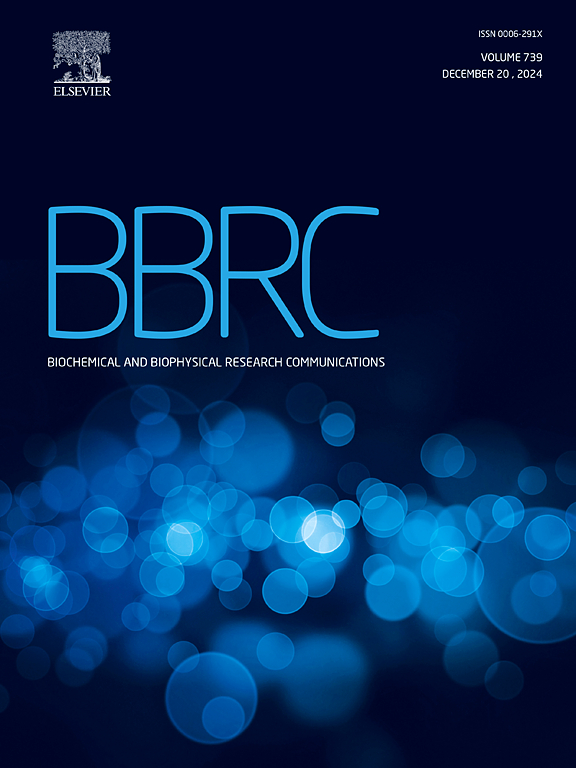Polyphyllin I enhances the anti-tumor efficacy of Palbociclib by reversing M2 macrophage polarization in lung cancer
IF 2.2
3区 生物学
Q3 BIOCHEMISTRY & MOLECULAR BIOLOGY
Biochemical and biophysical research communications
Pub Date : 2025-06-18
DOI:10.1016/j.bbrc.2025.152228
引用次数: 0
Abstract
Lung cancer is a significant hazard to human health, with limited treatment options. Although CDK4/6 inhibitors like Palbociclib (Palb) have shown clinical promise, their effectiveness is often compromised by resistance. Our findings indicate that the Palb may promote M2-like macrophage polarization, which can facilitate tumor progression through immunosuppression. This study investigates the effect of Polyphyllin I (PPI) in counteracting Palb-induced M2 macrophage polarization and explored its synergistic anti-tumor potential when combined with Palb. In vitro, a macrophage polarization model showed that Palb enhanced the expression of M2 macrophage markers, which could be reversed by PPI. LLC cells were cultured with macrophage-conditioned medium (CM) showed that the PPI and Palb combination-CM group exhibited decreased proliferation, migration, and invasion capabilities in LLC cells and inhibited epithelial-mesenchymal transition (EMT) compared to the Palb-CM group. Moreover, the combination of PPI and Palb also enhanced anti-tumor effect in vivo. Mechanistically, the JAK-STAT pathway was enriched, and key signaling proteins associated with macrophage polarization, including TWEAK, p-JAK1 and p-STAT1, were significantly upregulated in the PPI-treated group. PPI can reverse Palb-induced M2 polarization by activating the TWEAK/JAK1/STAT1 signaling pathway, which can enhance the anti-tumor efficacy of Palb. These findings support PPI as a potential adjunct to CDK4/6 inhibitors for lung cancer therapy.
Polyphyllin I通过逆转肺癌中M2巨噬细胞极化来增强Palbociclib的抗肿瘤疗效
肺癌是对人类健康的重大危害,治疗选择有限。尽管像帕博西尼(Palbociclib)这样的CDK4/6抑制剂已经显示出临床前景,但它们的有效性经常受到耐药性的影响。我们的研究结果表明,Palb可能促进m2样巨噬细胞极化,从而通过免疫抑制促进肿瘤进展。本研究探讨了多叶素I (Polyphyllin I, PPI)在对抗Palb诱导的M2巨噬细胞极化中的作用,并探讨了其与Palb联用时的协同抗肿瘤潜力。体外巨噬细胞极化模型显示,Palb可增强M2巨噬细胞标志物的表达,而PPI可逆转这一作用。用巨噬细胞条件培养基(macrophage-conditioned medium, CM)培养LLC细胞,结果显示,与Palb-CM组相比,PPI和Palb联合CM组LLC细胞的增殖、迁移和侵袭能力下降,上皮-间质转化(epithelial-mesenchymal transition, EMT)受到抑制。此外,PPI与Palb联合使用也增强了体内抗肿瘤作用。在机制上,ppi处理组巨噬细胞JAK-STAT通路被富集,与巨噬细胞极化相关的关键信号蛋白,包括TWEAK、p-JAK1和p-STAT1显著上调。PPI可以通过激活TWEAK/JAK1/STAT1信号通路逆转Palb诱导的M2极化,从而增强Palb的抗肿瘤作用。这些发现支持PPI作为CDK4/6抑制剂的潜在辅助治疗肺癌。
本文章由计算机程序翻译,如有差异,请以英文原文为准。
求助全文
约1分钟内获得全文
求助全文
来源期刊
CiteScore
6.10
自引率
0.00%
发文量
1400
审稿时长
14 days
期刊介绍:
Biochemical and Biophysical Research Communications is the premier international journal devoted to the very rapid dissemination of timely and significant experimental results in diverse fields of biological research. The development of the "Breakthroughs and Views" section brings the minireview format to the journal, and issues often contain collections of special interest manuscripts. BBRC is published weekly (52 issues/year).Research Areas now include: Biochemistry; biophysics; cell biology; developmental biology; immunology
; molecular biology; neurobiology; plant biology and proteomics

 求助内容:
求助内容: 应助结果提醒方式:
应助结果提醒方式:


